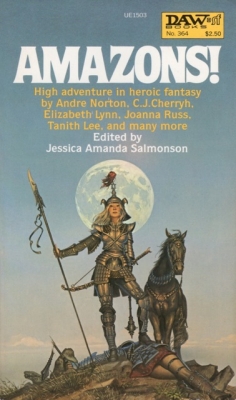The Golden Age of Science Fiction: “The Woman Who Loved the Moon,” by Elizabeth A. Lynn

The World Fantasy Awards are presented during the World Fantasy Convention and are selected by a mix of nominations from members of the convention and a panel of judges. The awards were established in 1975 and presented at the 1st World Fantasy Convention in Providence, Rhode Island. Traditionally, the awards took the form of a bust of H.P. Lovecraft sculpted by Gahan Wilson, however in recent years the trophy became controversial in light of Lovecraft’s more problematic beliefs and has been replaced with a sculpture of a tree. The Short Fiction Award (sometimes called short story award) has been part of the award since its founding, when it was won by Robert Aickman for “Pages from a Young Girl’s Journal.” In 1980, the year Lynn received the award for the story “The Woman Who Loved the Moon,” the convention was held in Baltimore, Maryland. Lynn tied for the award with Ramsey Campbell for the story “Mackintosh Willy.”
The World Fantasy Awards were good to Elizabeth A. Lynn in 1980. Her novels Watchtower and The Dancers of Arun both were nominated for the Best Novel award, with Watchtower winning, but her short story “The Woman Who Loved the Moon,” originally published in Jessica Amanda Salmonson’s anthology Amazons!, tied for the short fiction award (and the anthology would also win a World Fantasy Award that evening).
The story is a take on a traditional type of revenge fairy tale, although Lynn adds her own twists to it. Three sisters are mighty warriors in their homeland, so much that they scare off all possible suitors, reminiscent of the Greek story of Atalanta, times three. The sisters each specialize in a different weapon an eventually a warrior who claims to be from a distant land shows up and challenges and kills the first sister. On the stranger’s second visit, the second sisters seeks revenge and is also best in combat, but the third sister, in seeking vengeance falls in love and essentially enters a fairy realm, only returning home decades later.